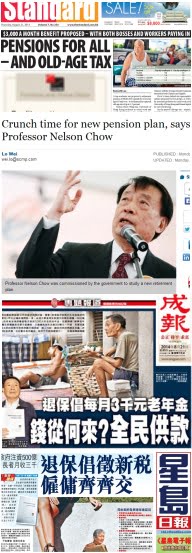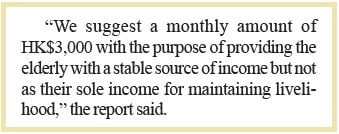How’s this for an exquisite bit of policymaking inanity?
That’s right: a solution to poverty in the form of a handout that’s not enough to live on.
Hong Kong has identified a problem in the form of elderly poor. The generation that grew up around the 1940s-50s were born into a time of chaos. Many had little  education and little opportunity during their working lives to save for retirement. The result is that a significant section of the over-65s struggle to get by and even end up picking through waste paper and making us feel terrible.
education and little opportunity during their working lives to save for retirement. The result is that a significant section of the over-65s struggle to get by and even end up picking through waste paper and making us feel terrible.
We have a fairly simple and practical remedy: improve the existing means-tested welfare safety-net by increasing the amount of cash it hands out and making the application system less humiliating. There is no need to raise taxes: simply stop squandering public funds on pointless infrastructure projects and excessive civil service salaries. And this would not commit us to a long-term burden, as the cost could level off and even decline in the decades ahead as the impoverished elderly die out and better-educated and wealthier generations come up for retirement.
But that would be too easy. It would also require the bureaucrats to be honest about Hong Kong’s fiscal situation. The truth is that, despite all the panic-spreading about the ‘aging society’ and future deficits, the government has far more money stuffed away in reserves than it knows what to do with. Add the billions constantly leaking out through stupid expenditure priorities, and it’s got more still. It is the last thing they want to admit.
Luckily for the bureaucrats, our politicians and activists are fixated with the idea of a universal pension. As the Western world’s social security systems show, such entitlements can become entrenched and bloated and ultimately ruinous. To be self-funded and sustainable, it would require new revenue streams. Push this button and you get instant mayhem, as everyone points fingers all over the place demanding that someone else pay for it. In practice, it all comes out of our pockets in the end, regardless of whether you call it ‘government subsidy’, ‘employer contribution’, ‘extra profits tax’ or, obviously, ‘salary deduction’. But battlers for social justice and economic sense will fight to the death over it anyway.
So after a year-long study, a group of academics and other geniuses under Professor Nelson Chow propose several variants of a HK$3,000 a month universal pension funded by some form of payroll tax. As the paragraph at the top makes clear, it won’t be enough for the truly impoverished to live on. For many of the rest, it will essentially be a form of forced savings; bizarrely, it would co-exist with the Mandatory Provident Fund, which the group seems to propose maintaining separately, maybe for heritage preservation reasons. In a perhaps insulting attempt to sell the idea to the middle class who don’t need it, Chow assures the better off that they won’t be subsidizing poorer people.
You wouldn’t have thought that so many experts could devise a system that hasn’t a chance of being implemented and which wouldn’t solve the problem if it were. But they pulled it off.
Worth a Silver Bauhinia Star, surely.

